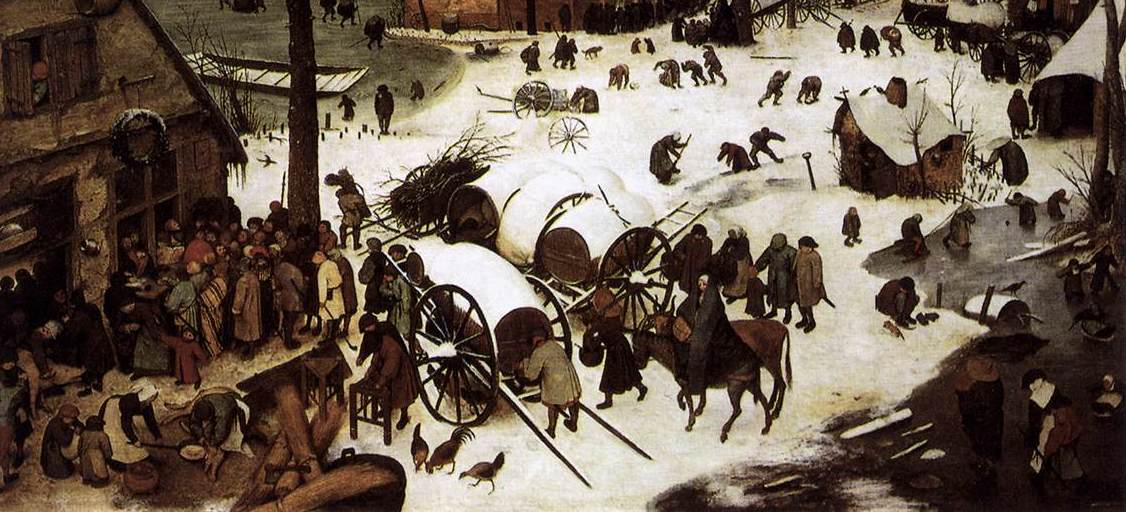by Abbey von Gohren
The other day I heard the line sung “let every heart prepare him room,” and it made me grieve. I have not prepared him room very well in my heart as of late. What’s more, the season for such things is upon us and I—well, I just flat out haven’t done much thinking about the coming of Christ. No marking out of days, or counting down, or anticipation. Not even Christmas cookies. What I find myself anticipating is disappointment, which is to say, dread. Of what? That Christmas day will come and I will not have. That I will not have done any of the thinking to land upon it right. That I will not have played Handel’s Messiah or Sufjan Stevens’ Songs for Christmas ad nauseam. (That I will have missed advent services.) That I will not have read the Gospel of Luke.
The manger scene just went up last night, but without much fanfare. The tree stood for days without lights, and now it stands without ornaments. Like a tree without fruit. (It is said they are accursed.) Deep fear under all of this is that Christmas will not come. If I have not labored to prepare him room — in my house, my calendar, or my heart—will he come? We are not talking Santa Claus and a few presents, here, we’re talking ultimate life. Will the bringer of life come?
Then I remembered the innkeeper.
I imagine that just at that moment a servant boy called him in front, gestured to a haggard-looking couple, shrugged, and ran off to chores. It was a woman in labor, her desperate husband at her side. “There’s no room for miles around.” The young man gulped and waited for favor from him, the innkeeper. But I have nothing to give you, he thought—no room, no time, no food. But a woman about to give birth, it was such a shame. Just when he was about to turn them away, sorrowful-like, he tossed out an idea. There was the barn. At least they’d be shielded from the elements. And though the innkeeper shook his head at the crudity of it and wondered what his father would have thought (letting guests stay with the animals!) it was better than turning them away. It was mercy, however imperfect.
The innkeeper—overworked, overwhelmed, his mind as far as could be from coming redeemers, especially in the unlikely form of a baby. The census had coincided with the holidays, and all the rooms were abuzz. He had rubbed his hands in anticipation, because the ledgers would look nice afterward. But for now he wiped his brow and cursed his good luck, unable to keep up from one thing to the next. “Some innkeeper I am,” he probably thought to himself when the ale ran out for the third time in two days. He had endured a hard look or two. A few threatened not to pay.
I am certainly that innkeeper this Christmas. The one who hadn’t prepared him room, who hadn’t anticipated much but the hard facts of the here and now. What can be gained from the busy season and how to survive it? What needs to be finished, graded, taught, bought, wrapped, done? The to-do list is endless, while the hours and energy are not. That is how I have been living. But my neglect is not enough to keep him away—is this not glorious news? If he came to the innkeeper, can he not come to me?
Yes, and he still does come. He arrives on our doorstep, and not always in traditional garb or amidst the usual trappings. But rather, in the form of other human beings who, like us, are desperate, empty, and needing of mercy. And we can choose to be merciful. Or not. But whatever we do to the least of these, we do to him. Christmas still comes, always comes, and how we react to him in the hidden, strange moments will enlarge our hearts. It will make room for the dear Christ. Will I be like the innkeeper, caught off-guard but oddly moved by compassion, making room where there seems to be none?
Making room where there seems to be none. That reminds me.
So there we were, that night this week in the gas station parking lot. We stopped to wash the windows and I sat and grumbled about having to stop at all, especially in that ridiculously tiny lot where there’s never enough room. And sure enough, as I sat behind the wheel wedged between two cars, that minivan ahead backed up slow, I had nowhere to go, and we crunched together. Then, there was the awkward hello as we wondered whether to exchange insurance. My husband offered to exchange contact details instead—hey, if you could just give me fifty bucks to do the repairs myself, maybe that’s better for everyone. Seemed like a generous offer. And yet we were pushed to give more.
As we peered at him for a reaction, squinting through the sleety rain, to our great surprise, this big, burly man was weeping. I remember one long tear track in particular streaming along the side of his bulbous nose from a reddish eye. Then came a plea in broken English—“Pleaz, can I pay you fitty dollar nest month?” Oh, his raw need, caked with clear shame and sorrow from God only knows what. It took our breath away. What can you do in the face of suffering like that, but let your heart grow and make room? So in that cramped parking lot, we made space. We wanted to love this man who had trembled for what we might do to him. What had he been through to make him so very fearful and sad? What could we offer, but forgiveness, a firm handshake, a quick follow-up call to reassure him? I wanted to give him the world, even though it was he who had backed into us. Where does that love come from, but from above?
To the innkeeper busy with his ledger,
To a woman in labor with no place to bear her child,
To a soon-to-be father who feels powerless to provide,
To a twenty-first-century couple who needs to be reminded what love feels like,
To a man who fears the worst from his fellow human beings but receives pardon,
To a world full of unready people, still he comes.

Abbey von Gohren is from Minneapolis, MN. She teaches French and leads high-school seminars on philosophy, history
Header Image: The Census at Bethlehem, Pieter Bruegel the Elder, 1566 (detail)






12 Comments
Robbie Lewis
He comes. With a stab to our thickened hearts, with a flash of light to our blinded eyes. Just lovely.
Abbey
Yes! Thanks for reading.
Pam
Yet in this same season you are raising a precious little boy who “gets it” in terms of the Christ story – displaying his grasp of that story in his LEGO play. All which comes from watching and listening to a pair of parents who model on a daily basis their belief that “He still comes.” Maybe there will or won’t be holiday cookies or a BH&G-decorated tree, but I did watch you read THE story to your little guy the other day. Preparation has been happening!!!
Abbey
Hurray for Legos! : ) Thanks so much, Pam.
Jan
Just lovely, Abby. He comes into our messy lives and says, ” I’m with you, don’t be afraid.”
Abbey
Indeed he does, Jan! Thanks for reading.
Henry Lewis
A powerful, deeply moving reminder of the season – a season that never ends – and our own vulnerabilities. Lovely.
Abbey
It is good to be vulnerable. Thank you for reading!
Jen
AMEN! Thank you Abbey! I am warmed by His spirit in you!
Abbey
And I, you Jen!
Monica
Just beautiful, Abbey! Thanks for sharing these beautiful thoughts. ♥️
Abbey
Thank you for reading, Monica!